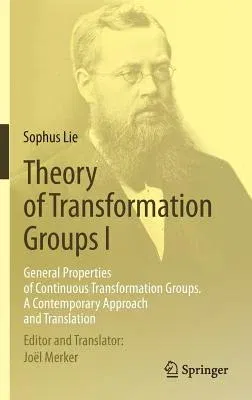Sophus Lie
(Author)Theory of Transformation Groups I: General Properties of Continuous Transformation Groups. a Contemporary Approach and Translation (2015)Hardcover - 2015, 27 March 2015

Qty
1
Turbo
Ships in 2 - 3 days
In Stock
Free Delivery
Cash on Delivery
15 Days
Free Returns
Secure Checkout

Print Length
643 pages
Language
English
Publisher
Springer
Date Published
27 Mar 2015
ISBN-10
3662462109
ISBN-13
9783662462102
Description
Product Details
Author:
Book Edition:
2015
Book Format:
Hardcover
Country of Origin:
NL
Date Published:
27 March 2015
Dimensions:
23.39 x
15.6 x
3.51 cm
Genre:
Historical
ISBN-10:
3662462109
ISBN-13:
9783662462102
Language:
English
Location:
Berlin, Heidelberg
Pages:
643
Publisher:
Weight:
1093.16 gm